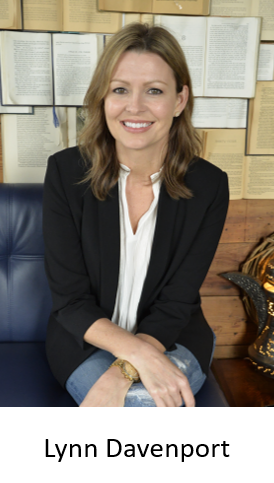Blockchain in Education:
Building for Lifelong Tracking & Control
Blockchain in education is positioned as a decentralized digital database (or ledger) for the purpose of holding student transcripts, but which also includes personal information such as vaccine history and mental health data. As researcher, podcaster, and former IT professional Lynn Davenport explained in a July video interview with Catching Fire News, blockchain can be described as "blocks of data shared across a chain of computer systems or blocks stored in a virtual chain. It's being sold as something great because it's decentralized; it cuts out the centralized authority, or government, and it's referred to as 'decentralized ledger technology, or DLT.'"
Davenport calls the city of Dallas, where she resides, "a hotbed of blockchain enthusiasts." During her interview with Catching Fire News, she detailed a pilot program involving the Dallas Independent School District (ISD) which shows that just the opposite of decentralization is actually taking place.
A single for-profit company called GreenLight Credentials was awarded what Davenport termed "a sweet no-bid deal through Dallas ISD, our regional [education] service centers, the Texas Education Department, and the Dallas Community College District." She points out that "this one company holds all this information; all the transcripts, vaccine history, and it holds mental health data." As many observers may imagine, much of the student mental health information is mined from intrusive questionnaires administered by public school districts such as the Dallas ISD.
Centralizing data and power
Davenport reiterates that "they're centralizing power and authority over all this private sensitive information with one company," in what GreenLight Credentials aptly calls the "Life Locker." As Education Reporter described in its May 2022 issue, blockchain is a digital system that will be employed in other areas of life, such as "records of transactions made in bitcoin or another cryptocurrency maintained across a number of computers linked in a peer-to-peer network."
 While blockchain is a complex subject that appears to not yet be fully developed, it's easy to imagine that a digital record established when a child enters preschool and maintained throughout his academic career is then used to track him for the rest of his life through employment, medical care, financial transactions, purchasing habits, etc. Davenport notes: "GreenLight's 'life transcript' can expand beyond [academic] grades to include professional certifications, job experiences, verified skills, and more. According to Forbes, GreenLight is one of a handful of companies providing access to blockchain records."
While blockchain is a complex subject that appears to not yet be fully developed, it's easy to imagine that a digital record established when a child enters preschool and maintained throughout his academic career is then used to track him for the rest of his life through employment, medical care, financial transactions, purchasing habits, etc. Davenport notes: "GreenLight's 'life transcript' can expand beyond [academic] grades to include professional certifications, job experiences, verified skills, and more. According to Forbes, GreenLight is one of a handful of companies providing access to blockchain records."
In researching what was happening with blockchain in the Dallas-Fort Worth area, Davenport discovered "the Commit Partnership," founded by former Goldman-Sachs Real Estate Executive Todd Williams, whom she describes as having no education credentials but who was very successful. "Our mayor appointed him as his education advisor, and from there he grew in power with our Texas Education Agency, and then our governor appointed him to four boards and commissions."
She adds: "This is important because he has access to multiple ISDs in the metroplex and has access to these data sharing agreements." She relates that it was Williams and The Commit Partnership that chose Greenlight's blockchain technology for the Dallas ISD pilot program. Other organizations are embedded in the data sharing agreements as well, and the question becomes, how many organizations actually have access to these volumes of student data?
As Davenport and other investigative researchers have noticed, the data sharing networks "are vast." Some tentacles "are tied to 'Teach for America,' some to big investors such as Steve Ballmer, former CEO of Microsoft, and some to 'machine learning' and artificial intelligence (AI)." Davenport says she learned from fellow researcher Alison McDowell that "all this data is being fed into human capital markets and is also creating the digital twins of our children: you've got your virtual [avatar] self and your 'real' self and they are 'learning' you through massive amounts of data that can be commodified."
Davenport asserts that the Dallas ISD is also experimenting with a "metaverse campus," where students attend school virtually by entering into "a video game-like setting a couple of days a week" and for the remaining days attend classes in their regular school setting. The May 2022 issue of Education Reporter described a similar program being piloted at the University of Arizona.
Data sharing across the globe
During her discussion with Davenport, Catching Fire News host Lynne Taylor, a writer, speaker, and researcher in her own right as well as a tireless opponent of Common Core, noted that "all this data sharing has to comply with international data standards." She cited a recently signed international agreement that will result in "all that data winding up at the United Nations."
Once the digital blockchain system is fully in place, a child's digital avatar and data ledger will determine his rewards and penalties throughout his life based on how well he conforms to established "norms," and many can hazard a guess as to what those will be. Guidelines for acceptable ideas, beliefs, and practices will be uniform across the globe, and conformers will be rewarded while non-conformers will be penalized and/or punished.
Blockchain and school choice
A critical piece of this control involves harnessing school choice. But rather than viewing the school choice movement as a negative, Davenport believes the pushers of blockchain will use it to their advantage by tying the granting of education vouchers to government funding. "When [public] money follows the child," observes Davenport, "so does the government and so do the strings. Parents who are trying to escape the public-school system will find themselves entangled in a new system of fraud, waste, abuse, and control."
 Taylor notes that this is already happening in Arizona with the state's universal school choice program. "If you really look at it, there are so many parameters that are not included in Arizona's constitution," she observes. "There are so many red flags, one of which is that economists, not educators, are calling the shots." She reports that Arizona parents must sign an annual contract agreeing to comply with all the program's criteria. "If you don't sign the agreement, you can be fined or even imprisoned." The actual education dollars are doled out by the state on a "card" authorized and operated by a third party, so parents never see the funds in their bank accounts. Taylor says parents must "continually go to this third party and say 'mother may I please.' That's not freedom; that's not choice."
Taylor notes that this is already happening in Arizona with the state's universal school choice program. "If you really look at it, there are so many parameters that are not included in Arizona's constitution," she observes. "There are so many red flags, one of which is that economists, not educators, are calling the shots." She reports that Arizona parents must sign an annual contract agreeing to comply with all the program's criteria. "If you don't sign the agreement, you can be fined or even imprisoned." The actual education dollars are doled out by the state on a "card" authorized and operated by a third party, so parents never see the funds in their bank accounts. Taylor says parents must "continually go to this third party and say 'mother may I please.' That's not freedom; that's not choice."
The above sounds like a dismal, disappointing prospect for a movement that so many have held in such high and hopeful regard for so long. Both Taylor and Davenport agree that parents are so frustrated with the public schools and what they have become that any offer of school choice is attractive, even if it becomes yet another trap. "They just want to see the collapse of the public-school system," says Davenport. "And they don't care about the strings" that may be tied to vouchers.
She is convinced that Texas authorities plan to expand blockchain throughout the education system in the Lone Star State. "There are 5.4 million children in Texas education, and the Dallas program will be scaled throughout the state, and then nationwide. I have seen Department of Education documents indicating that they are absolutely watching what is happening in the Dallas ISD with Greenlight Credentials and with Dallas Community College, which has been involved in expanding the role of 'The Commit Partnership' at the state and local levels."
Running for office
In an attempt to shine a light on the threat posed by blockchain technology, not only to children but which will eventually impact every American, Davenport ran for a seat on the Dallas College Board of Trustees for District 1. Three candidates faced off, one of which was an incumbent. "It was pretty much a David and Goliath situation," she concedes. "But I ran in order to expose what I had learned. "
When the third candidate entered the race, she knew she was facing an uphill battle. Even though she ultimately lost the June 18 election, she says she accomplished two of her three goals in running. "We managed to bump out the incumbent, so that was one victory," she says. "The other was to expose not only the blockchain implementation but other issues at the community college level, such as the adoption of U.N. Sustainable Development Goals.
Davenport received 36 percent of the vote and says she has no regrets about her decision to run. She encourages others to run for local offices in an effort to take back their communities. She urges potential candidates not to worry about winning, noting that "the idea is to engage the voters and encourage them to pay attention to what is going on, and that's a really awesome opportunity."
She reports having spent only $4,000 of her own money on her race, foregoing the fundraising and printing of signs and instead running a totally "organic" campaign. "You have to put your ego aside. I didn't want to see myself or my name everywhere on signs. We shouldn't put politicians on a pedestal; it breeds narcissism and corruption. My goal was to enlighten people about education and that's what I focused on."
Although she experienced four months of grueling campaigning, Davenport says she "truly loved the opportunity because it woke people up to things they just didn't know were happening. They will go back to sleep, but at least now they can't say they don't know."
Want to be notified of new Education Reporter content?
Your information will NOT be sold or shared and will ONLY be used to notify you of new content.
Click Here
Return to Home Page
